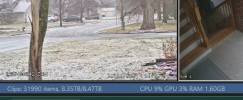It currently looks as if the “strict” requirement for TPM 2.0 will be dropped. This would make many older devices an option again. Otherwise, you can book the ESU package for Windows 10 from the Pro version onwards. Then you can at least get security updates for ~$120 per year.
Another option would be virtualization, but then your host should be a bit more powerful.
From Grok 3: (By the way, if you haven't tried Grok 3, you should give it a go - it's incredible - you can get to it via X on the left-hand menu halfway down or
Grok is a free AI assistant designed by xAI to maximize truth and objectivity. Grok offers real-time search, image generation, trend analysis, and more.

grok.com
)
Microsoft has not officially dropped the TPM 2.0 requirement for Windows 11. As of the latest updates in December 2024, Microsoft continues to emphasize TPM 2.0 as a "non-negotiable" standard for Windows 11, particularly for security reasons, with senior product manager Steven Hosking reinforcing its necessity for features like Secure Boot and Windows Hello for Business.
There were reports in December 2024 suggesting Microsoft had loosened the TPM 2.0 requirement, allowing Windows 11 installation on systems without it. However, these claims were clarified as misleading. Microsoft updated its support page to warn against installing Windows 11 on unsupported hardware, stating that such systems may not receive updates, including security patches, and could face compatibility issues. The page does not indicate a removal of the TPM 2.0 requirement but rather highlights the risks of bypassing it.
Microsoft has also removed a previously published workaround for bypassing TPM 2.0 checks, indicating a stricter stance against unsupported installations. Despite this, unofficial workarounds like using
tools such as Rufus or FlyBy11 still exist, though they come with risks like potential update blocks or system instability.
Recent posts on X reflect ongoing frustration with the TPM 2.0 requirement, with some users noting difficulties upgrading older systems and others confirming workarounds still function. However, these posts are anecdotal and not definitive evidence of policy changes.
In summary,
TPM 2.0 remains a core requirement for official Windows 11 support, and Microsoft is doubling down on this for security purposes, especially with Windows 10 support ending in October 2025. Users with incompatible hardware can still force installations using workarounds, but Microsoft strongly discourages this, and such systems may not be fully supported.
All of that said, as
@Flintstone61 posted, it's not that expensive (after all) to find a replacement machine with a TPM 2.0 module. It just the pain of transferring to it, etc. just to accommodate a questionable OS requirement.
At least MS is offering extended support for $30/year per machine. Or just do nothing like some have mentioned. Probably better not getting MS updates anyway like was mentioned.
Still, BI running on Linux would be a nice option, but may not be feasible.
Great discussion though, and extremely helpful. Thanks to everyone that chimed in.


